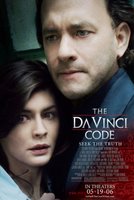
“The Da Vinci Code”
“The Da Vinci Code,” directed by Ron Howard based on Dan Brown’s bestselling theological suspense thriller of the same name, falls dramatically short of its promise to take you on a lightening-paced, intelligent, intricately layered, and suspenseful international scavenger hunt to uncover a centuries old mystery. While the novel ingeniously mixed action with intrigue while exploring the intricate complexities of religious theory and history and made it accessible in the guise of a captivating chase story, the reported $125 million film adaptation fails to live up to its provocative source material. Although the film does succeed in raising some thought provoking questions about history versus the creation of history, its 2-1/2 hour running time and uneven pace turn it into an overly long, bloated, and disappointing melodrama – the antithesis of Brown’s exciting, tightly wound page-turner.
While in Paris delivering a talk and promoting his latest book, acclaimed Harvard symbologist Professor Robert Langdon (Tom Hanks) receives an urgent summons to the Louvre Museum where an elderly curator, Jacques Sauniere (Jean-Pierre Marielle), whom he was scheduled to meet earlier that day, has been brutally murdered. Once inside the museum, Langdon finds a baffling cipher near the body. He joins forces with gifted French police cryptologist Sophie Neveu (Audrey Tautou), and together they attempt to decode the enigma. Along the way, they discover a mysterious trail of symbols, bizarre riddles, and unexpected secrets hidden in the works of Leonardo Da Vinci – clues that are visible for all to see and yet ingeniously disguised by the painter. Their dangerous quest leads to a covert society dedicated to guarding an ancient secret that has remained concealed for 2000 years.
The stakes are raised when Langdon uncovers a startling link: the late curator was involved in the Priory of Sion – a secret society whose members included Da Vinci and Sir Isaac Newton, among others. Langdon suspects they are on the hunt for a breathtaking historical secret, one that has proven through the centuries to be as enlightening as it is dangerous. The pair’s frantic race to solve the mystery before the secret falls into the wrong hands takes us on a whirlwind adventure through the cathedrals and castles of Europe from Paris to London to Scotland as they collect clues in a desperate attempt to crack the code. Along the way, they match wits with a mysterious powerbroker who appears to anticipate their every move. Unless they can decipher the labyrinthine puzzle, the Priory’s secret and an explosive ancient truth will be lost forever.
Akiva Goldsman’s dull-witted, plodding adaptation strives to remain faithful to the book’s major plot elements, but it inadvertently brings to light the obvious shortcomings of Brown’s entertaining bestseller which were well disguised by the novel’s clever structure and compelling premise. At first glance, the novel appears to be highly cinematic with its fast-paced action compressed into a 24-hour time frame. But appearances are deceiving. While Goldsman attempts to meet the daunting challenge of interpreting a complex, intricate piece of fiction and turning it into compelling cinematic narrative, the end result is stodgy, confusing and frequently too literal-minded. His script awkwardly blends intrigue and menace with mystery in a confusing and illogical tale of enigma, secrets and riddles layered clumsily one upon another. According to production notes, the script incorporates several things that Brown learned after writing the novel, making the movie in some ways an updated, annotated version of the original book. Director Howard also adds backstory to the film that was only referred to in the novel. Unfortunately, the digitized flashback sequences are cheesy, distracting and confusing. They disrupt the narrative flow rather than enhance and clarify the storyline, and they add unnecessarily to the film’s already considerable length. Indeed, the film seems to get lost in its own maze of puzzles and riddles and long-winded explanations that suck the life out of what was originally a very engaging and fun story, offering audiences instead something that is extremely laborious and solemn. Howard insists on telling us everything rather than showing us
In addition to Hanks and Tautou in the lead roles, the strong supporting cast includes Sir Ian McKellen as Sir Leigh Teabing, the story’s Holy Grail historian and deranged puppetmaster; Jean Reno as the relentless French police captain Bezu Fache; Alfred Molina as the manipulative Bishop Aringarosa; and Paul Bettany as Silas, the deadly albino monk. Hanks’s character is driven by curiosity and a wonderfully dry sense of humor. He’s smart, fascinated by the world around him, and convincing as a thinking man’s hero who is determined to unravel the mystery. And despite the off-screen jokes about it, his long, swept back hairdo seems appropriate for an unsuspecting university professor who is unexpectedly caught up in a mysterious and deadly conspiracy. That said, there are moments when the actor seems a little lost as though he’s trying to find a hook for his character and there is none. Hanks also lacks the dashing, charismatic qualities that would have made his character’s relationship with Tautou’s Neveu far more interesting. In the second English-language film of her career, alluring French actress Tautou brings impressive nuance to her work and creates a pivotal character that is enigmatic, intrepid, and ethereal, although occasionally her heavy accent makes her dialogue unintelligible. Unfortunately, the chemistry between Hanks and Tautou is sadly missing as is any romantic involvement between their characters.
No comments:
Post a Comment